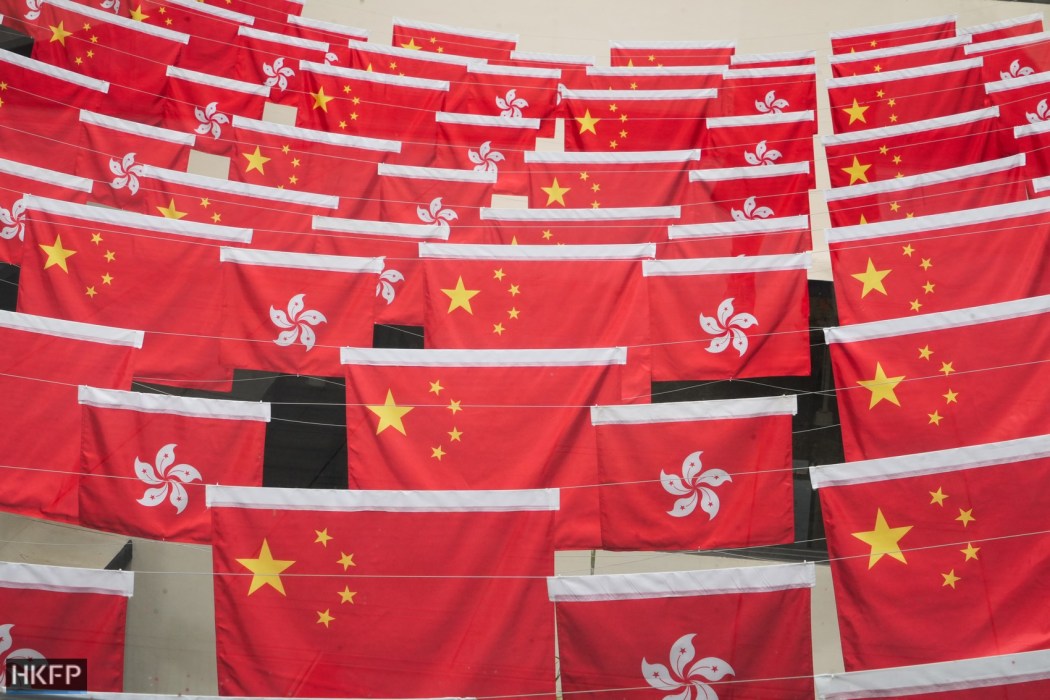A Hong Kong teenager has been granted bail pending appeal after he was sentenced to a training centre over sedition and insulting the national anthem and national flag in December last year.
Chui Hoi-chun, 19, appeared in front of Judge Anna Lai at the Court of First Instance on Wednesday. He was represented by barrister Steven Kwan.

Chui was sentenced to a training centre last December after pleading guilty to four offences, including one count of “doing an act or acts with seditious intentions” under the colonial-era law, intending to insult the national anthem by intentionally publishing “altered lyrics,” and intentionally publishing “a desecration of the national flag” with intent.
Hong Kong’s national anthem law, which criminalises insults to China’s national anthem, the March of the Volunteers, was enacted on June 4, 2020 – violators risk a fine of up to HK$50,000 or three years in prison. The national flag and emblem law was passed on September 29 last year, with the maximum penalty being a HK$50,000 fine and three-year imprisonment.
Chui was granted bail after the judge adjourned the appeal for potentially more than nine months.
Some of the grounds for appeal raised by Kwan were identical to those raised in pro-democracy activist Tam Tak-chi’s appeal, which was heard by the Court of Appeal earlier this month.

A ruling is expected in Tam’s case within nine months. Lai said that the court would hear Chui’s appeal within two weeks of the Court of Appeal ruling on Tam’s appeal.
| 💡Under court reporting restrictions on bail proceedings, written and broadcast reports are limited to only include the result of a bail application, the name of the person applying for bail and their representation, and the offence concerned. |
Chui was ordered to pay a cash bail of HK$20,000, and hand over his travel documents. He was also barred from leaving the city, was ordered to live at his declared address, and he must report to the police three times per week.
The teenager was also barred from committing any acts that could harm national security, using social media platforms including Discord, YouTube, Facebook, Instagram and popular local online forum LIHKG. Chui was also banned from accepting any media interviews.
The sedition law, which is under the Crimes Ordinance, is separate from the Beijing-imposed national security law.
The sedition law outlaws incitement to violence, to disaffection and to other offences against the administration while the national security law, enacted in June 2020, criminalises subversion, secession, collusion with foreign powers, and terrorist acts.

However, defendants charged under the colonial-era law face the same stringent bail threshold as those charged under the sweeping security law.
Judges consider not only the defendant’s risk of absconding or obstructing justice, but also whether there are sufficient grounds for believing they “will not continue to commit acts endangering national security.”
Chui has remained in detention since his arrest in September last year before he was sentenced to a training centre three months later.
Training centre sentences are a custodial alternative for young offenders aged between 14 and 20. The length of the sentence, decided by the head of the Correctional Service Department and dependant on the offenders’ conduct, ranges from six months to three years.
Correction 20/07/2023: An earlier version of the article misspelled the appellant’s surname in two instances. It should be Chui, not Chiu. We regret the error.
Support HKFP | Policies & Ethics | Error/typo? | Contact Us | Newsletter | Transparency & Annual Report | Apps
Help safeguard press freedom & keep HKFP free for all readers by supporting our team
























